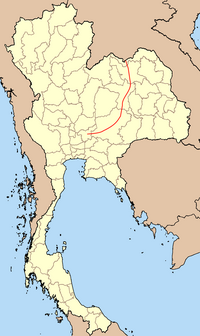Mittraphap Road
| National Highway 2 | |
|---|---|
| ทางหลวงแผ่นดินหมายเลข 2 | |
| ถนนมิตรภาพ Thanon Mittraphap "Friendship Highway" | |
| Route information | |
| Part of | |
| Length | 509.113 km (316.348 mi) |
| Existed | 1957–present |
| Major junctions | |
| Southwest end | |
| Northeast end | Nong Khai, Thai–Lao Friendship Bridge |
| Location | |
| Country | Thailand |
| Provinces | Saraburi, Nakhon Ratchasima Khon Kaen Udon Thani, Nong Khai |
| Highway system | |
Mittraphap Road (Thai: ถนนมิตรภาพ, RTGS: Thanon Mittraphap, pronounced [tʰā.nǒn mít.trā.pʰâːp]; Northeastern Thai: ถนนมิตรภาพ, pronounced [tʰā.nǒn mìt.tā.pʰâːp]) or Highway 2 (Thai: ทางหลวงแผ่นดินหมายเลข 2, RTGS: Thang Luang Phaendin Mailek Song) is one of the four primary highways in Thailand, along with Phahonyothin Road (Highway 1), Sukhumvit Road (Highway 3), and Phetkasem Road (Highway 4). It runs from Saraburi to Nong Khai.
The road was originally built from Khorat to Nong Khai by the United States in 1955–1957[1] at a cost of US$20 million to supply its northeastern military bases.[2]: 56–57
It is the first highway in Thailand to meet international standards, and the first highway in Thailand to use both asphalt and concrete. It received the name "Thanon Mittraphap" on 20 February 1957. The name literally means "Friendship Road". It is the main road that connects Isan (northeastern Thailand) across the Dong Phaya Yen Range. The highway begins at Saraburi, Phahonyothin Road (Highway 1) junction. It passes through the provinces of Nakhon Ratchasima, Khon Kaen, Udon Thani, and ends in Nong Khai, where it links with the Thai-Lao Friendship Bridge to Laos.
-
Six-lane expanded Mittraphap Road near Lam Takhong, Nakhon Ratchasima
-
Mittraphap Highway in Nong Khai
-
Thai-Lao Friendship Bridge
References
[edit]- ^ Baker, Chris; Phongpaichit, Pasuk (2009). A History of Thailand (2nd, paper ed.). Cambridge University Press. p. 156. ISBN 9780521759151.
- ^ Keyes, Charles F (March 1967). "Isan: Regionalism in Northeastern Thailand". Cornell Thailand Project; Interim Reports Series, No. 10 (PDF). Ithaca: Department of Asian Studies, Cornell University. Retrieved 16 August 2019.





